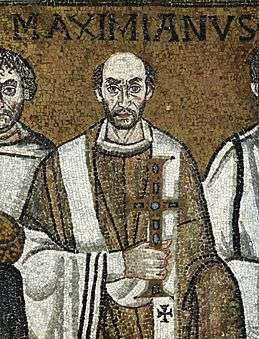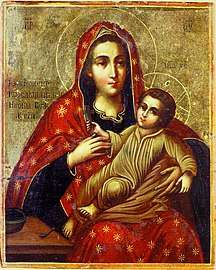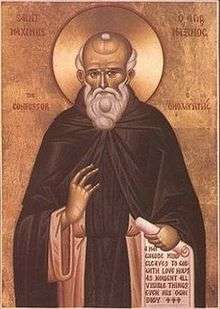February 21 (Eastern Orthodox liturgics)
February 20 - Eastern Orthodox liturgical calendar - February 22
All fixed commemorations below are observed on March 6 (March 5 on leap years) by Eastern Orthodox Churches on the Old Calendar.[note 1]
For February 21st, Orthodox Churches on the Old Calendar commemorate the Saints listed on February 8.
Saints
- Saint Eustathius of Antioch, Archbishop of Antioch (337)[1][2][3][4][note 2]
- Hieromartyr Severian, Bishop of Scythopolis in Palestine (452)[1][6][note 3]
- Venerable Andreas and Anatolios, monastics of the Church of Jerusalem, disciples of Venerable Euthymius the Great (5th century)[3][8][note 4]
- Saint Maximianus of Ravenna, Bishop of Ravenna and Confessor (c. 556)[7][9][note 5] (see also: February 22)
- Saint John Scholasticus, Patriarch of Constantinople (577)[1][3][10][11]
- Saint Zachariah, Patriarch of Jerusalem (632)[1][3][12][13][14][note 6]
- Venerable Timothy of Symbola on Mt. Olympus in Bithynia (795)[1][3][15][16][note 7]
- Saint George of Amastris, Bishop of Amastris on the Black Sea (c. 805)[1][3][18][19][20]
Pre-Schism Western saints
- Saint Felix of Metz, third Bishop of Metz in France for over forty years (2nd century))[7][21]
- Saint Severus and Sixty-Two Companions, martyrs in Syrmium in Pannonia (3rd-4th centuries)[21]
- Saint Alexander of Adrumetum, martyred with others in North Africa (c. 434)[21]
- Martyrs Verulus, Secundinus, Siricius, Felix, Servulus, Saturninus, Fortunatus and Companions, martyrs in North Africa, probably under the Vandals (c. 434)[21][22][note 8][note 9]
- Saint Paterius, a monk, disciple and friend of St Gregory the Great, he became Bishop of Brescia and was a prolific writer (606))[7][21]
- Saint Pepin of Landen, Duke of Brabant, he was the husband of St Ida and the father of St Gertrude of Nivelles and St Begga (c. 646)[21][23]
- Saint Ercongotha, daughter of King Erconbert of Kent and St Saxburgh, became a nun at Faremoutiers-en-Brie under her aunt, St Ethelburgh, but reposed very young (660)[21]
- Saint Gundebert (Gumbert, Gondelbert), Bishop of Sens in France, later the founder of the monastery of Senones around 660 (c. 676)[21]
- Saint Germanus of Granfelden, Abbot of Granfield in the Val Moutier in Switzerland, martyred with another monk, Randoald, while interceding for the poor (677)[21][24]
- Saint Avitus II of Clermont, Bishop of Clermont in Auvergne, one of the great bishops of the age (689)[21]
- Saint Valerius, a monk and Abbot of San Pedro de Montes, he left several ascetic writings (695)[21]
Post-Schism Orthodox saints
- Saint Macarius, Hieroschemamonk of Glinsk Hermitage (1864)[1]
Other commemorations
- "Kozelshchina" (Kolzelshchanskaya) Icon of the Most Holy Theotokos (1881)[1][25][26][27][note 10]
- Repose of Blessed Simon (Todorsky), bishop of Pskov (1754)[1] (see also: February 22)
Icon gallery
 St. Eustathius of Antioch, Archbishop of Antioch.
St. Eustathius of Antioch, Archbishop of Antioch. Saint Maximianus of Ravenna.
Saint Maximianus of Ravenna. "Kozelshchina" (Kolzelshchanskaya) Icon of the Most Holy Theotokos.
"Kozelshchina" (Kolzelshchanskaya) Icon of the Most Holy Theotokos.
Notes
- The notation Old Style or (OS) is sometimes used to indicate a date in the Julian Calendar (which is used by churches on the "Old Calendar").
The notation New Style or (NS), indicates a date in the Revised Julian calendar (which is used by churches on the "New Calendar"). - Kontakion of the Hierarch. Plagal of Fourth Tone.
"Since thou hadst wholly purified thyself with godly deeds, thou wast a notable example of a true high priest, while excelling in divine vision and a pure life. As a pillar and foundation of the Church of Christ, thou withstoodest all temptations with great steadfastness. Hence, we cry to thee: Rejoice, O Father Eustathius."[5] - "At Scythopolis, in Palestine, St. Severian, bishop and martyr."[7]
- Venerable Andreas originated from Mytilene and Venerable Anatolios was from Raithu.
- Consecrated Bishop of Ravenna in Italy in 546, he built the Basilica of San Vitale, which was dedicated in the presence of the Emperor Justinian and his wife Theodora. Holding a jewelled cross, he is depicted in mosaics standing next to the Emperor.
- In the Jerusalem Canonarion he is listed on January 31 and October 28. Note that the "Commemoration of the Fall of Jerusalem in 614 AD to the Persians", which occurred during his tenure as Patriarch, takes place on May 17.
- Kontakion of the Righteous One. Fourth Tone.
"Thou didst rise up from the East like a most bright star, shining with the splendour of the virtues of thy miracles within the hearts of all faithful men, O wonderworker of godly mind, Timothy."[17] - Hadrumetum is given as the place of their martyrdom and their number as twenty-six.
- "At Adrumetum, in Africa, during the persecution of the Vandals, the holy martyrs Verulus, Secundinus, Syricius, Felix, Servulus, Saturninus, Fortunatus, and sixteen others, who were crowned with martyrdom for the confession of the Catholic faith."[7]
- See: (in Russian) Козельщанская икона Божией Матери. Википедии. (Russian Wikipedia).
gollark: Ah, of course, you memetically encoded your entry into an image.
gollark: 1. do thing2. verify thing is done3. ???4. profit
gollark: > exercise
gollark: Gibson (monoid).
gollark: Gibson (Neuromancer author).
References
- February 21 / March 6. Orthodox Calendar (Pravoslavie.ru).
- Great Synaxaristes: (in Greek) Ὁ Ἅγιος Εὐστάθιος Πατριάρχης Ἀντιοχείας. 21 Φεβρουαρίου. Μεγασ Συναξαριστησ.
- (in Greek) Συναξαριστής. 21 Φεβρουαρίου. Ecclesia.gr. (H Εκκλησια τησ Ελλαδοσ).
- St Eustathius the Archbishop of Antioch. OCA - Lives of the Saints.
- The Great Horologion or Book of Hours. Transl. from the Greek by the Holy Transfiguration Monastery. Boston, Massachusetts, 1997. p. 427.
- March 6 / February 21. Holy Trinity Russian Orthodox Church (A parish of the Patriarchate of Moscow).
- The Roman Martyrology. Transl. by the Archbishop of Baltimore. Last Edition, According to the Copy Printed at Rome in 1914. Revised Edition, with the Imprimatur of His Eminence Cardinal Gibbons. Baltimore: John Murphy Company, 1916. pp. 54-55.
- Great Synaxaristes: (in Greek) Οἱ Ὅσιοι Ἀνδρέας καὶ Ἀνατόλιος. 21 Φεβρουαρίου. Μεγασ Συναξαριστησ.
- Great Synaxaristes: (in Greek) Ὁ Ἅγιος Μαξιμιανὸς Ἀρχιεπίσκοπος Ραβέννης. 21 Φεβρουαρίου. Μεγασ Συναξαριστησ.
- Great Synaxaristes: (in Greek) Ὁ Ἅγιος Ἰωάννης ὁ ἀπὸ Σχολαστικῶν Πατριάρχης Κωνσταντινουπόλεως. 21 Φεβρουαρίου. Μεγασ Συναξαριστησ.
- St John “Scholasticus”, Patriarch of Constantinople. OCA - Lives of the Saints.
- Great Synaxaristes: (in Greek) Ὁ Ἅγιος Ζαχαρίας Πατριάρχης Ἱεροσολύμων. 21 Φεβρουαρίου. Μεγασ Συναξαριστησ.
- St Zachariah, Patriarch of Jerusalem. OCA - Lives of the Saints.
- Rev. Sabine Baring-Gould (M.A.). "S. Zacharias, Patr. of Jerusalem. (A.D. 631.)." In: The Lives of the Saints. Volume the Second: February. London: John C. Nimmo, 1897. pp. 359-360.
- Great Synaxaristes: (in Greek) Ὁ Ὅσιος Τιμόθεος ὁ ἐν Συμβόλοις. 21 Φεβρουαρίου. Μεγασ Συναξαριστησ.
- Venerable Timothy of Symbola in Bithynia. OCA - Lives of the Saints.
- The Great Horologion or Book of Hours. Transl. from the Greek by the Holy Transfiguration Monastery. Boston, Massachusetts, 1997. p. 426.
- Great Synaxaristes: (in Greek) Ὁ Ἅγιος Γεώργιος Ἐπίσκοπος Ἀμάστριδος. 21 Φεβρουαρίου. Μεγασ Συναξαριστησ.
- St George the Bishop of Amastris on the Black Sea. OCA - Lives of the Saints.
- Rev. Sabine Baring-Gould (M.A.). "S. George of Amastris, B. C. (Beginning of 9th Cent.)." In: The Lives of the Saints. Volume the Second: February. London: John C. Nimmo, 1897. pp. 363-364.
- February 21. Latin Saints of the Orthodox Patriarchate of Rome.
- Great Synaxaristes: (in Greek) Οἱ Ἅγιοι Βερούλιος, Σεκουνδίνος, Σιρίκιος, Φελίσιος, Σέρβουλος, Σατουρνίνος, Φουρτουνάτος καὶ οἱ σὺν αὐτοῖς. 21 Φεβρουαρίου. Μεγασ Συναξαριστησ.
- Rev. Sabine Baring-Gould (M.A.). "B. Pepin of Landen, C. (A.D. 646.)." In: The Lives of the Saints. Volume the Second: February. London: John C. Nimmo, 1897. pp. 360-361.
- Rev. Sabine Baring-Gould (M.A.). "SS. German, Ab., and Randoald, Prior, MM. (End of 7th Cent.)." In: The Lives of the Saints. Volume the Second: February. London: John C. Nimmo, 1897. pp. 361-363.
- (in Russian) 21 февраля (ст.ст.) 6 марта 2014 (нов. ст.). Русская Православная Церковь Отдел внешних церковных связей. (Decr).
- Great Synaxaristes: (in Greek) Σύναξις Ὑπεραγίας Θεοτόκου ἐν Κοζελσλὰνκ τῆς Ρωσίας. 21 Φεβρουαρίου. Μεγασ Συναξαριστησ.
- Icon of the Mother of God “Kozelshchansk”. OCA - Lives of the Saints.
Sources
- February 21 / March 6. Orthodox Calendar (Pravoslavie.ru).
- March 6 / February 21. Holy Trinity Russian Orthodox Church (A parish of the Patriarchate of Moscow).
- February 21. OCA - The Lives of the Saints.
- The Autonomous Orthodox Metropolia of Western Europe and the Americas. St. Hilarion Calendar of Saints for the year of our Lord 2004. St. Hilarion Press (Austin, TX). pp. 16-17.
- The Twenty-First Day of the Month of February. Orthodoxy in China.
- February 21. Latin Saints of the Orthodox Patriarchate of Rome.
- The Roman Martyrology. Transl. by the Archbishop of Baltimore. Last Edition, According to the Copy Printed at Rome in 1914. Revised Edition, with the Imprimatur of His Eminence Cardinal Gibbons. Baltimore: John Murphy Company, 1916. pp. 54-55.
- Rev. Richard Stanton. A Menology of England and Wales, or, Brief Memorials of the Ancient British and English Saints Arranged According to the Calendar, Together with the Martyrs of the 16th and 17th Centuries. London: Burns & Oates, 1892. p. 80.
Greek Sources
- Great Synaxaristes: (in Greek) 21 Φεβρουαρίου. Μεγασ Συναξαριστησ.
- (in Greek) Συναξαριστής. 21 Φεβρουαρίου. Ecclesia.gr. (H Εκκλησια τησ Ελλαδοσ).
Russian Sources
- (in Russian) 6 марта (21 февраля). Православная Энциклопедия под редакцией Патриарха Московского и всея Руси Кирилла (электронная версия). (Orthodox Encyclopedia - Pravenc.ru).
- (in Russian) 21 февраля (ст.ст.) 6 марта 2014 (нов. ст.). Русская Православная Церковь Отдел внешних церковных связей. (Decr).
This article is issued from Wikipedia. The text is licensed under Creative Commons - Attribution - Sharealike. Additional terms may apply for the media files.

